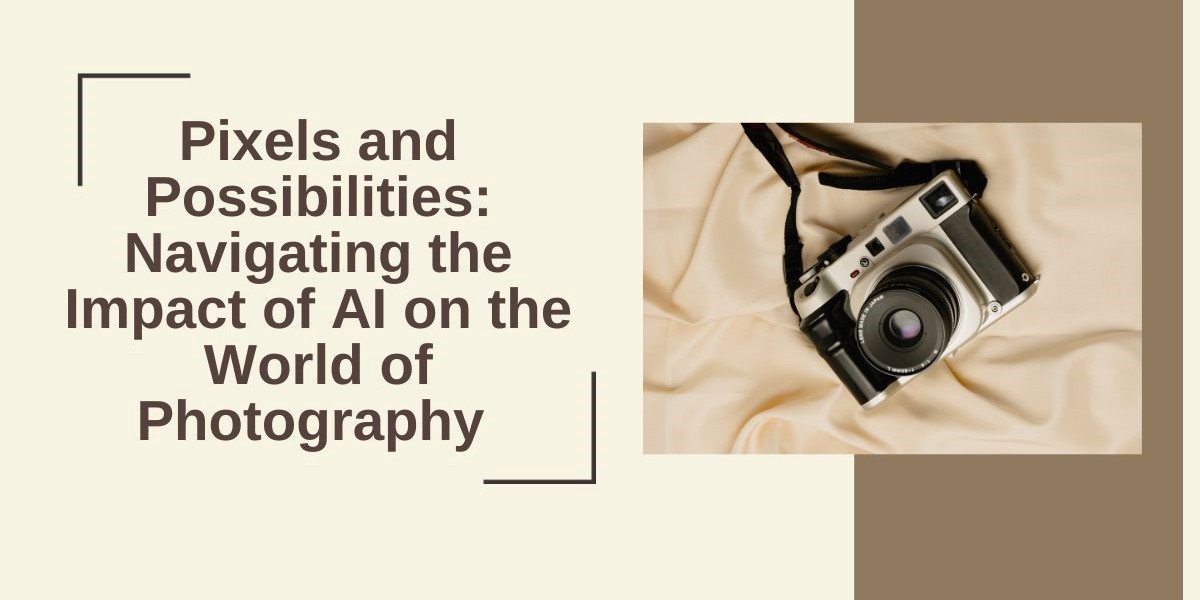Introduction
AI is transforming photography by changing how we capture and process images. AI revolutionizes creativity with smart editing tools and intelligent camera settings based on scene analysis. This increases output and simplifies work for both beginners and experts. However, when AI is used in photography more frequently, ethical and cultural concerns surface, casting doubt on our conceptions of originality and creativity. This exploration dives into the changing world where technology and art meet, reshaping how we see and capture moments in a space where pixels and algorithms come together.
AI's Transformative Role in Modern Photography
AI is revolutionizing photography, changing how we capture, process, and interpret images. At the nexus of technology and art, this influence is evident, causing a dramatic change in the creative atmosphere. AI is revolutionizing the photography business as a vital tool for both beginners and pros.
1. Automating Photography with AI-Enhanced Cameras
Camera functionality is being transformed by AI, which makes them more intelligent and user-friendly. Artificial intelligence (AI)-powered intelligent camera capabilities evaluate scenes in real-time and automatically modify settings for the best outcomes. This entails detecting people and landscapes and adjusting exposure levels appropriately. Such automation not only simplifies technical aspects for beginners but also enables experienced photographers to concentrate more on composition and creativity.
2. Enhancing Image Quality through AI Algorithms
The quality of photos has been greatly improved by AI algorithms. Neural network-powered picture super-resolution methods improve image details, making images crisper and more vivid even in dim lighting. Smoother and more polished photos are produced by AI-driven noise reduction algorithms, which are skilled at reducing graininess. These developments add to the overall improvement in photo quality and significantly increase the visual appeal of images.
3. AI-Driven Image Editing Tools
Post-processing has evolved with AI-driven image editing tools, becoming more sophisticated. Neural networks, trained in aesthetics and style, enable tools to automatically enhance photos intelligently. These tools, using machine learning, predict and implement changes aligned with the user's preferences, streamlining editing. From color correction to object removal, this empowers photographers to achieve professional-looking results with minimal manual effort.
4. Facial Recognition for Personalized Photography
By automatically recognizing and labeling people in images, AI-driven face recognition is revolutionizing photography. This facilitates image organization and opens up possibilities for customized photo experiences. Important faces are always recorded in a frame thanks to cameras and applications that emphasize shooting moments with identifiable people.
5. AI's Role in Augmented Reality (AR) Photography
The mix of AI and augmented reality is creating exciting possibilities in photography. AI-guided AR overlays can add extra info, graphics, or interactive elements to photos. This lets photographers tell immersive stories and express themselves uniquely. Whether it's adding travel details or artistic touches, the partnership of AI and AR broadens the creative options for photographers.
6. Ethical Considerations in AI-Enhanced Photography
As AI becomes more ingrained in photography, ethical concerns become important. Issues like privacy, consent, and how AI manipulates images responsibly come up. Deepfakes, where AI creates realistic fake images or videos, raise worries about spreading false information and distorting reality. Balancing innovation with ethical responsibility is crucial as photography changes.
7. Creative Challenges and Opportunities
AI brings benefits but challenges traditional ideas of creativity and authorship. Automating tasks might make everything look the same, risking individual expression. However, AI can also inspire and push creative limits. Finding a balance between using AI's power and keeping a photographer's unique style is a continuous challenge in our tech-driven era.
8. Societal Impact of AI-Integrated Photography
AI in photography has big effects on society. It makes photography easier for everyone by handling technical stuff. But, it also creates large databases of visuals, leading to concerns about who owns the data, its security, and how it might be misused. As AI keeps changing photography, it's crucial to think about these issues and set up rules for using AI responsibly.
Conclusion
Without a question, a new era is about to begin in terms of addressing how AI will affect the photography sector. Every facet of photography has been influenced by artificial intelligence, from advanced photo editing programs to automated camera features.
Photographers must deal with the ethical issues and difficulties presented by AI when they use new technologies. Navigating this changing terrain requires finding a careful balance between keeping the authenticity of artistic expression and utilizing AI's potential. In order to go forward, it will be necessary to embrace innovation while also making sure that photography as an art form continues to be a genuine expression of human creativity and vision.
With ZoopUp, Set Out on a Future-Ready Freelance Journey! Handle the Intersection of Technology and Creativity.
FAQs
- How does AI enhance image editing tools?
AI tools use smart technology to make photos look better by understanding style and automatically improving them, making editing easier.
- What role does facial recognition play in AI photography?
AI recognizes faces in photos, tagging them automatically. This makes it easy to organize pictures and creates a personalized experience.
- What ethical considerations arise in AI-enhanced photography?
AI in photography raises privacy concerns, urging responsible use. The proliferation of deepfakes intensifies worries, as fake images can propagate misinformation. Striking a balance between technological advancement and ethical considerations becomes imperative to mitigate potential harm and uphold the integrity of visual content.
- How does AI impact creativity in photography?
AI not only makes photos alike but also inspires fresh ideas, pushing us to think differently about how we show things visually. This opens up exciting new ways to be creative and encourages us to mix things up in the art world.
- What societal impact does AI-integrated photography have?
AI democratizes photography, making it more accessible. However, it also raises questions about data ownership, security, and potential misuse in the creation of vast visual databases.



